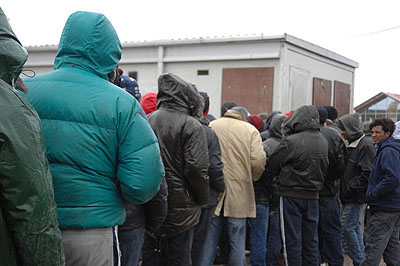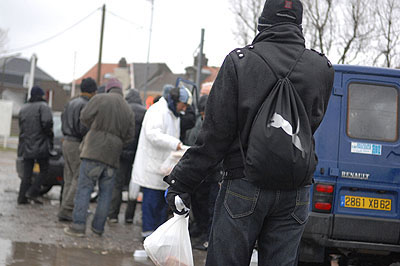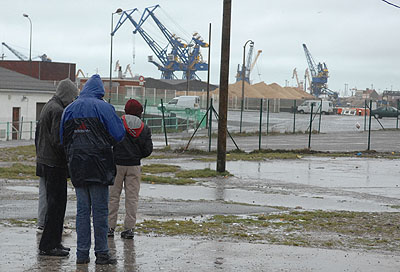On The Ground - Calais, France: Migration, Immigration, Starvation
Oscar Beard | 18.12.2007 17:18 | Migration

Homeless refugees queue for food

Food delivered twice a day - but not enough to go around

Three refugees huddle together under dockland cranes
In Calais on that cold winter morning our group first came into contact with two African refugees wandering the streets near the dock.
“You two stay here,” said our French-Arabic interpreter, “you look like cops with cameras.”
He went off to talk to the two Africans. After several minutes they led him down a back street into a derelict building, where he disappeared for 30 minutes.
When he returned, the interpreter recounted what he had seen. A group of eight to ten African refugees huddled together, wind, rain and cold blowing through with no hope of real shelter. One man sat with a large bleeding gash in his head.
The injured man said the police caught him the previous night and hit him in the head with a steel bar. Too scared to attend hospital his friends had patched him up as best they could.
In 2002 the British government forced the closure of the Red Cross Sangatte centre in Calais, under the ruse that everyone trying to enter the UK was registered at the shelter prior to entering the country illegally. Therefore, in the eyes of the UK government, it was the fault of Sangatte that so many were coming to the port to get into England, to steal our jobs, our benefits and taxpayers money.
But if that were true, then the problem would have gone away when word trickled back that Sangatte was closed for business.
Instead, all that has happened is those who once sought refugee at Sangatte are now massing in ever increasing numbers on the streets of Calais, living under the many bridges of that small town, hiding in derelict buildings or living in the forest outside Calais, known as The Jungle.
They face regular removals to the countryside by French police, some encounter police violence. Then there is the fascist movement in Calais, growing numbers of gangs that seek out refugees and, to be blunt, try to kill or maim them.
Meanwhile official figures say there are some 500 refugees on the streets, others would say twice that, or more. They have no shelter, no adequate clothing or blankets to deal with the harsh winter that is already on us, and little to no chance of making it into the UK to find a vaguely better situation - that is if the immigration squads don’t pick them up and lock them into one of the many Immigration Removal Centres (IRCs) that imprison on average 25,000 a year.
By mid-morning we met with a group of Iraqi refugees, one of whom walked on crutches. In an attempt to jump on a truck, he had fallen six metres on to concrete and broken his leg. Lack of proper medical care resulted in him remaining on crutches, his leg never healing properly. He continually smiled and apologised for his lack of English.
They all huddled together under a building canopy, away from the lashing rain and Force Six storm that was battering the coast that day. The injured man’s friend told us of the situations they had escaped in Iraq, his own story an unimaginable account of life and death. His two brothers had been killed by militia and he was next. His entire street gave all the money they had and told him to leave immediately.
Since then he had never looked back, always aiming towards England and a better life. Instead he ended up in Calais, living on the streets for six months, surviving on scraps and food handouts from the only voluntary group delivering meals, twice a day. But even they could not keep up with the increasing influx of refugees.
As a battered Portacabin served food at 2pm to a queue of over 100 “non people”, we met a young Afghan refugee, 14-years-old, two years older than my own daughter.
This boy told me the story of his journey from Northern Afghanistan to where he stood in front of me that grey, cold and rotten lunchtime. In the space of one month he had travelled across seven countries, covering the entire length of Turkey strapped to the underside of a train. The Turkish authorities had stolen what little money he had. And now he was there, stuck in Calais, waiting for that magical day he would finally make it to England, to London.
I asked him what he wanted to do in England: “I want to study at Oxford University,” he replied.
I didn’t have the heart to tell him what may await him and others if they make it here - the immigration system, the newly appointed immigration and border squads and the detention centres, the prisons.
That evening at 6pm the volunteer group again handed out food. A line of over 200 people waited for perhaps the only meal they would get that day.
Now, some two weeks since those terrible scenes of final desperation in lives that had already seen so much - that anyone with half a heart would not let stand - the protests are bursting out in small and sporadic movements across the UK. The Home Office has been blockaded - much to the upset of the security, who just didn’t see it coming - and the dawn raid centres, where people are at this moment locked by their necks to gates.
Today the London Metro newspaper (Page 2) ran the story “’Asylum amnesty’ claim from Tories”. The picture that illustrated the article was captioned as “Asylum seekers in Calais queue up for transportation to enter Britain”.
The truth is this photograph by David Parker is of the Portacabin where they were queuing to receive a meal, the only meal for many of those on the streets.
Dying of hypothermia, starving to death, escaping the War On Terror, theses are people who have lost everything but hope - those that dared to risk it all, health, life, limb and family - for one last attempt at something more human than they faced before.
Oscar Beard
Additions
Sangatte 5 years ago.
18.12.2007 19:43
 http://www.indymedia.org.uk/en/2002/10/44070.html
http://www.indymedia.org.uk/en/2002/10/44070.html  http://www.indymedia.org.uk/en/2002/10/44077.html
http://www.indymedia.org.uk/en/2002/10/44077.html The reality is that Sangatte was closed by the British tabloid media. This achieved nothing as far as immigration to the UK was concerned. It has just spread homeless refugees up and down the coast near the ports where they are now freezing and starving. The temperature is expected to hit -5 at night by this time next week. The volunteers from organisations like 'Salam' who are feeding the refugees are completely over stretched.
Sangatte was a tiny bit of humanity in an otherwise appalling situation. It was closed in 2002 by the French home secretary, a Mr Sarkozy.....
Guido
 e-mail:
guidoreports@riseup.net
e-mail:
guidoreports@riseup.net
These groups provide help, and need it.
19.12.2007 08:59
 http://www.csur62.com - Collectif de soutien d'urgence aux réfugiés de Calais - C'SUR
http://www.csur62.com - Collectif de soutien d'urgence aux réfugiés de Calais - C'SUR Medecins du Mond, ZA les Alouettes. 62220 Saint Nicolas les Arras. Pas-de-Calais
 http://associationsalam.org - Association SALAM
http://associationsalam.org - Association SALAM After you have saved money on a day-trip stop off and leave something at the food distribution centre close to the centre of Calais?
David Ash
 e-mail:
drash239@mac.com
e-mail:
drash239@mac.com
Comments
Display the following 3 comments